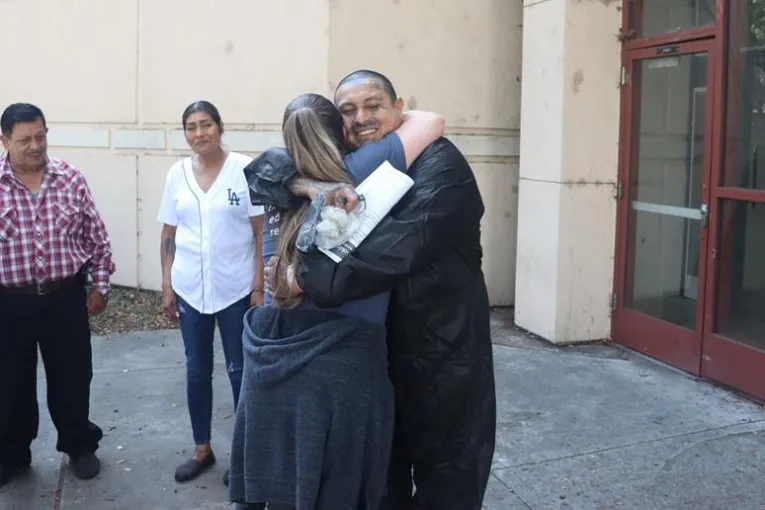
Los Angeles, CA – Jose Olivares walked out free on Wednesday, 13 years after being wrongly convicted for the death of his girlfriend’s son after a Los Angeles County judge vacated his conviction.
Lawyers from two Innocence Projects and a unit of the Los Angeles District Attorney’s Office had filed together to overturn his conviction.
Olivares was arrested in 2011 following the tragic death of his girlfriend’s almost four-year-old son from an accidental short fall.
Despite witness after witness who described Olivares as a loving, kind and nurturing father figure to the decedent, the jury relied on now-debunked medical testimony that the fatal injuries could “only” have been caused by what was then commonly referred to as shaken baby syndrome or abusive head trauma (SBS/AHT). They alleged Olivares must have intentionally inflicted the decedent’s injuries. Olivares was acquitted of murder and convicted of child abuse causing death, and sentenced to 25 years to life in prison.
Since then, medical advances have shown that the same injuries once believed to be reliable indicators of SBS/AHT do occur as a result of accidental falls of short distances —such as the fall that caused the decedent’s death. Witnessed and videotaped short falls resulting in the same injuries as the decedent have now been documented in peer-reviewed medical literature.
The request for the reversal of Jose Olivares’ wrongful conviction was filed jointly by the Northern California Innocence Project (NCIP) of Santa Clara University School of Law; the Loyola Project for the Innocent (LPI), part of Loyola Law School; and the Los Angeles County District Attorney’s Office Habeas Litigation Unit.
In Olivares’ case, Dr. Judy Melinek, a renowned forensic pathologist, authored a report in 2023 after a thorough review at NCIP’s request, and stated that an accidental short fall was the “reasonable and likely explanation” for the decedent’s injuries.
Importantly, too, one of the primary prosecution experts who alleged abuse in Olivares’ 2014 trial, Dr. Donald Minckler, reviewed the case at the request of the Habeas Litigation Unit of the Los Angeles District Attorney’s Office (HABLIT) and has since reversed his finding. He noted in a 2024 report that “as of this point of time, there are no specific indicators of SBS from a pathology point of view” and he “would now revise [his 2014] conclusion to an accidental fall” as the most consistent conclusion for the injuries in this case. Minckler’s report added that “there were no significant bruises or other fractures or skin marks consistent with physical abuse by another person. Also, the family members were adamant that the accused was not an abuser.”
NCIP and LPI filed a petition for writ of habeas corpus in June 2023 to secure Olivares’ release. On August 16, 2024, the HABLIT filed a letter with the Court conceding that evidence now known to be false was used to convict Olivares at his 2014 trial. Olivares’ conviction was vacated on September 19, 2024. Another division of the DA’s office has indicated they might re-try Olivares, and he was held in custody until October 2, when he was released on bail.
“Mr. Olivares’ case is both extraordinarily unique and tragically common because faulty medical testimony has been used for too long to convict far too many loving parents and caretakers,” said NCIP Clinical Supervising Attorney Lauryn Barbosa Findley. “The facts always showed that Mr. Olivares was innocent but the medicine needed time to catch up and prove it. We strongly urge the DA’s office to heed the medical evidence and not try him erroneously a second time.”
Olivares’ case came to the attention of NCIP through a large-scale project – which began in 2019 – to identify and litigate wrongful convictions in California that were the product of unreliable medical evidence surrounding SBS/AHT. NCIP identified hundreds of convictions and found that many of them bear the hallmarks of a wrongful conviction based on new scientific evidence. NCIP is in active litigation in three additional cases.
“We are the first to undertake this holistic and comprehensive approach to identifying, analyzing, and challenging shaken baby syndrome cases,” said NCIP Executive Director Todd Fries. “Through our extensive data collection and research, it is evident that there was and still is implicit bias in the prosecution of shaken baby syndrome cases, particularly with respect to race and socio-economic status.”
Funding for NCIP’s extensive work in SBS research and litigation was provided as part of the U.S. Department of Justice’s Upholding Rule of Law and Preventing Wrongful Convictions Program, in addition to funding from an Equal Justice Works Fellowship sponsored by Fenwick & West, LLP.